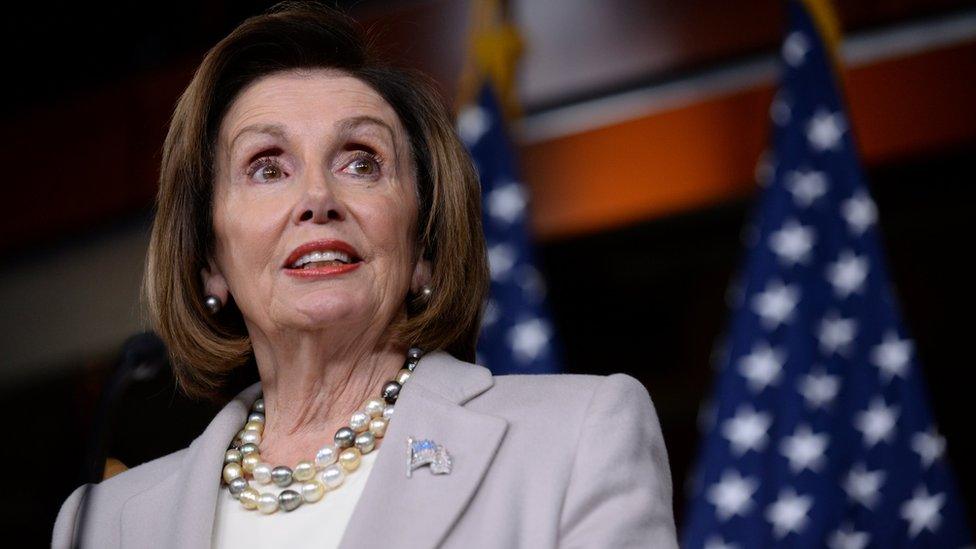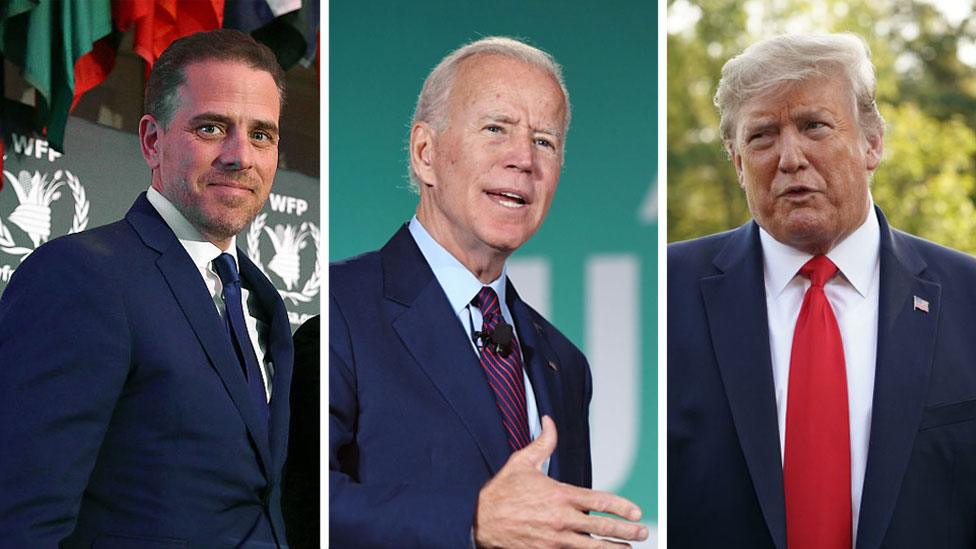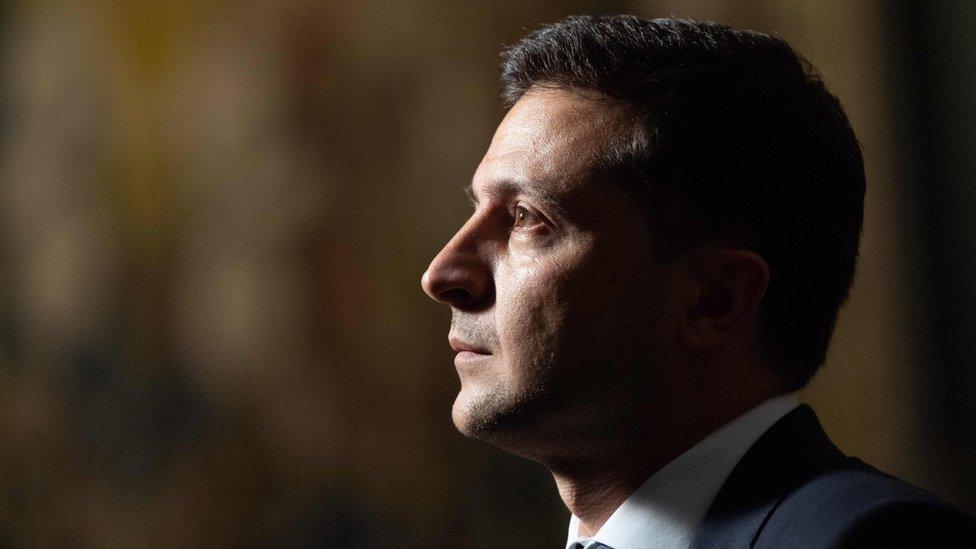Trump impeachment: House votes to formalise inquiry
- Published
The moment US House votes for impeachment inquiry
The US House of Representatives has passed a resolution to formally proceed with the impeachment inquiry against President Donald Trump.
The measure details how the inquiry will move into a more public phase. It was not a vote on whether the president should be removed from office.
This was the first test of support in the Democratic-controlled House for the impeachment process.
The White House condemned the vote, which passed along party lines.
Only two Democrats - representing districts that Mr Trump won handily in 2016 - voted against the resolution, along with all Republicans, for a total count of 232 in favour and 196 against.
The resolution also sets out due process rights for Mr Trump's lawyers under the congressional inquiry.
The Republican president is accused of trying to pressure Ukraine into investigating unsubstantiated corruption claims against his political rival, Joe Biden, and his son who worked with Ukrainian gas company Burisma.
Mr Trump denies wrongdoing.
Republicans have criticised Democrats for the closed hearings - in which Republican lawmakers have also taken part. But Democrats insist they were needed to gather evidence ahead of the public stage of the investigation, and deny allegations they have been secretive.
The resolution moves the inquiry to a new phase, which could eventually see articles of impeachment recommended against Mr Trump. If that happened, and the House voted to pass the articles, a trial would be held in the Senate.

A historic clash ahead

Republicans have been clamouring for weeks for the Democrats to hold a full vote that will formalise the impeachment inquiry in the House of Representatives. Now they got one.
It won't alter the dynamic in Washington, however.
Republicans will continue to object to what they see as an unfair process with a preordained result. Democrats will push ahead with an investigation that they always intended would culminate in dramatic public hearings and (perhaps) an impeachment vote.
This doesn't mean that Thursday's proceedings are meaningless, however. For the first time since 1998, the House is taking a significant step toward impeaching a president.
The resolution gives the public some idea what to expect in the days ahead - including lots of Intelligence Committee sparring between Democrats and Republicans, a look at the transcripts from some of the high-profile witness depositions already conducted and, at some point, a formal report that could serve as the basis of articles of impeachment.
It's not exactly uncharted territory in US history, but the course being set leads toward a historic clash with the presidency at stake.

What does the resolution say?
In the first stage, the House Intelligence Committee will hold public hearings in the coming weeks. It will have the right to make public transcripts of depositions taken in private.
Trump impeachment: Last week was the most dramatic so far
In the second stage, a public report on the findings will be sent to the House Judiciary Committee which will conduct its own proceedings and report on "such resolutions, articles of impeachment, or other recommendations as it deems proper".
President Trump's lawyers will be allowed to take part in the Judiciary Committee stage.
Republicans will be able to subpoena documents or witnesses although they could still be blocked as both panels are controlled by Democrats.
What's the reaction?
House Speaker Nancy Pelosi, who is the most senior elected Democrat, said the procedures would allow lawmakers to decide whether to impeach Trump "based on the truth".
"I don't know why the Republicans are afraid of the truth," she added.
But House Republican leader Kevin McCarthy argued that Democrats are trying to remove Trump "because they are scared they cannot defeat him at the ballot box" in next year's presidential election.
White House press secretary Stephanie Grisham said in a statement: "Speaker Pelosi and the Democrats have done nothing more than enshrine unacceptable violations of due process into House rules."
Allow X content?
This article contains content provided by X. We ask for your permission before anything is loaded, as they may be using cookies and other technologies. You may want to read X’s cookie policy, external and privacy policy, external before accepting. To view this content choose ‘accept and continue’.

What's behind the impeachment inquiry?
At the heart of the investigation, which was announced by Mrs Pelosi last month, is a phone call on 25 July between Mr Trump and Ukrainian President Volodymyr Zelensky.

House Speaker Nancy Pelosi announced the impeachment inquiry last month
A rough transcript of the call shows Mr Trump asking for an investigation into the Bidens. Joe Biden is a frontrunner in the race for the Democratic nomination ahead of next year's presidential election.
The call was the subject of a complaint by a whistleblower, whose identity has been closely protected by lawmakers.
What does it take to impeach a president?
What about Thursday's testimony?
Tim Morrison, who served as top adviser on Russia and Europe at the National Security Council, has testified to lawmakers.
He was one of the officials authorised to listen in on Mr Trump's call with the president of Ukraine.
The aide corroborated last week's testimony by Bill Taylor, the top US diplomat in Ukraine, that Mr Trump had tried to use his office to prod Ukraine into investigating Mr Biden.
But Mr Morrison, who stepped down on Wednesday, also told the committee: "I want to be clear, I was not concerned that anything illegal was discussed."
Meanwhile, House investigators have invited former US National Security Adviser John Bolton to testify on 7 November.
Mr Bolton's lawyer said his client was not willing to appear voluntarily. No subpoena requiring him to testify has been issued so far.
Mr Bolton had angrily referred to alleged White House political pressure on Ukraine as "a drug deal", according to US media.
- Published5 February 2020

- Published20 January 2020

- Published25 September 2019